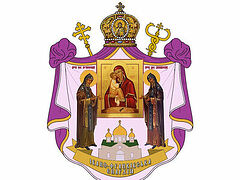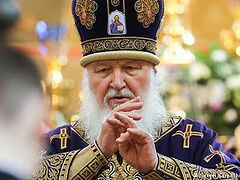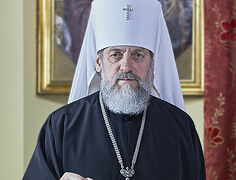Vilnius, Lithuania, April 18, 2022
 Photo: Fr. Gintaras Sungaila (right) is among the three priest concerned. Photo: lrt.lt
Photo: Fr. Gintaras Sungaila (right) is among the three priest concerned. Photo: lrt.lt
On March 17, His Eminence Metropolitan Innokenty, head of the Moscow Patriarchate’s Diocese of Lithuania issued a strong statement against the fratricidal war in Ukraine. He emphasized that Lithuania is not Russia and that its people can have their own views, and that he himself doesn’t agree with the political stance of the Russian Patriarch.
Then, on April 15, Lithuanian media began to report about three priests being punished, reportedly for speaking out against the war. According to lrt.lt, Fr. Vitalijus Mockus was dismissed from his position as rector of Holy Dormition Cathedral in Vilnius, while Frs. Gintaras Jurgis Sungaila and Vitalis Dauparas were dismissed from their respective positions and even suspended from priestly ministry.
According to the Lithuanian outlet’s article, “The Hand of Moscow?” the priests were presumably sanctioned under pressure from Moscow. One of them, Fr. Duaparas, reportedly “had already withdrawn from active duty in the Lithuanian Orthodox Archdiocese because of the ‘Russian world’ the patriarch was promoting.”
Later that day, the Lithuanian Diocese announced that the diocesan chancellor and Vilnius City Dean were being replaced by his vicar Bishop, His Grace Ambrose, “in order to raise the status” of these positions. As the new dean of the city, Bp. Ambrose was also appointed rector of the Vilnius cathedral.
According to the diocese, Frs. Sungaila and Dauparas themselves petitioned to be released from their duties.
“It should be emphasized that the above-mentioned decisions of Metropolitan Innokenty are exclusively an internal matter of the Church and have nothing to do with external factors. We believe that this statement will clarify what is happening and will avoid any kind of misinterpretation and speculation,” the diocesan statement concludes.
In an interview with lrt.lt, Fr. Sungaila noted that several priests had taken the position that if they had to commemorate Pat. Kirill in the services, they would leave. According to him, Met. Innokenty then made concessions in March, allowing them to not commemorate the Patriarch, but then everything suddenly changed, and he released them based on their own stance of preferring to leave rather than commemorate the Patriarch.
“Perhaps there was pressure from someone in Moscow?” Fr. Sungaila speculates.
However, this idea is complicated by the fact that Met. Innokenty issued another statement this morning, repeating his condemnation of the war in Ukraine.
“My position, expressed in the above-mentioned appeal, was, is and will be unchanged, for it is fundamental and does not depend on any internal or external circumstances,” His Eminence states.
“All sorts of fabrications about the role of the Orthodox Church in Lithuania as an instrument of other states are absurd. Those who do not know that the majority of parishioners of Orthodox parishes are people of middle and older age, mostly women and pensioners, can reason in this way. The assertion that the priests of the Orthodox Church in Lithuania support the war and justify aggression are malicious and untrue.”
However, “the time has finally come to speak openly about what we have so far refrained from speaking about,” His Eminence continues. “Within the bosom of the Orthodox Church in Lithuania, a group of clergy has formed who have long been hatching plans to move to the Patriarchate of Constantinople.”
“Everything was done in secret, but they started talking about it openly now, in connection with the tragic events in Ukraine,” he notes. While these priests present themselves as martyrs of the anti-war cause, “in reality we have ordinary schismatics before us,” the Metropolitan emphasizes.
In fact, in his interview with lrt.lt, Fr. Sungaila acknowledges that there are those who have long wanted to join Constantinople, and that he, in fact, was assisting them: “I knew that the Ukrainian, Greek, and Belarusian communities wanted to join the Patriarchate of Constantinople, and as a person who understands these matters, I wanted to help them with my knowledge and contacts.”
As he explains, he wasn’t sure whether to join Constantinople, because he wanted to remain with his parishioners, “And now, when we have no opportunity to serve, perhaps this is the only option—to turn to the Patriarch of Constantinople to open parishes here.” There was no desire among the priests to join Constantinople until after they were dismissed, he states.
According to Fr. Sungaila, it’s possible to talk about a real division amongst clergy in Lithuania. 10 out of 60 priests there disagree with the Patriarch’s position, he says, while many have reproached him “for the fact that Bandera is a hero for me, that I put on a heart-shaped badge of the Ukrainian flag, that I express solidarity with the Ukrainian Nazis, and so on.”
A few parishes of the Russian Church have already switched to the Patriarchate of Constantinople. In March, the clergy of the Church of St. Nicholas the Wonderworker in Amsterdam expressed their desire to join Constantinople. OrthoChristian has since been informed by the parish clergy that they were received into their new jurisdiction, with the majority of their parishioners following them.
In April, the Holy Cross Church in Udine, Italy, also announced its switch to Constantinople.
And according to the government of the Lvov Province in Ukraine, instead of joining the so-called “Orthodox Church of Ukraine,” the parish of the Church of St. Amphilochius of Pochaev in Mostiski joined the Patriarchate of Constantinople and now commemorates Patriarch Bartholomew in the services.
Follow OrthoChristian on Twitter, Vkontakte, Telegram, WhatsApp, MeWe, and Gab!




